Popular Science Books
45+ [Hand Picked] Popular Books On Science
Discover the list of some best books written on Science by popular award winning authors. These book on topic Science highly popular among the readers worldwide.

The Honey Bus: A Memoir of Loss, Courage and a Girl Saved by Bees by Meredith May
An extraordinary story of a girl, her grandfather and one of nature's most mysterious and beguiling creatures: the honeybee. Meredith May recalls the first time a honeybee crawled on her arm. She was five years old, her parents had recently split and suddenly she found herself in the care of her grandfather, an eccentric beekeeper who made honey in a rusty old military bus An extraordinary story of a girl, her grandfather and one of nature's most mysterious and beguiling creatures: the honeybee. Meredith May recalls the first time a honeybee crawled on her arm. She was five years old, her parents had recently split and suddenly she found herself in the care of her grandfather, an eccentric beekeeper who made honey in a rusty old military bus in the yard. That first close encounter was at once terrifying and exhilarating for May, and in that moment she discovered that everything she needed to know about life and family was right before her eyes, in the secret world of bees.May turned to her grandfather and the art of beekeeping as an escape from her troubled reality. Her mother had receded into a volatile cycle of neurosis and despair and spent most days locked away in the bedroom. It was during this pivotal time in May's childhood that she learned to take care of herself, forged an unbreakable bond with her grandfather and opened her eyes to the magic and wisdom of nature.The bees became a guiding force in May's life, teaching her about family and community, loyalty and survival and the unequivocal relationship between a mother and her child. Part memoir, part beekeeping odyssey, The Honey Bus is an unforgettable story about finding home in the most unusual of places, and how a tiny, little-understood insect could save a life.
I WANT TO READ THIS
Cribsheet: A Data-Driven Guide to Better, More Relaxed Parenting, from Birth to Preschool by Emily Oster
From the author of EXPECTING BETTER, an economist's guide to the early years of parenting With EXPECTING BETTER, award-winning economist Emily Oster spotted a need in the pregnancy market for advice that gave women the information they needed to make the best decision for their own pregnancies. By digging into the data, Oster found that much of the conventional pregnancy wi From the author of EXPECTING BETTER, an economist's guide to the early years of parenting With EXPECTING BETTER, award-winning economist Emily Oster spotted a need in the pregnancy market for advice that gave women the information they needed to make the best decision for their own pregnancies. By digging into the data, Oster found that much of the conventional pregnancy wisdom was wrong. In CRIBSHEET, she now tackles an even great challenge: decision making in the early years of parenting. As any new parent knows, there is an abundance of often-conflicting advice hurled at you from doctors, family, friends, and the internet. From the earliest days, parents get the message that they must make certain choices around feeding, sleep, and schedule or all will be lost. There's a rule--or three--for everything. But the benefits of these choices can be overstated, and the tradeoffs can be profound. How do you make your own best decision?
I WANT TO READ THIS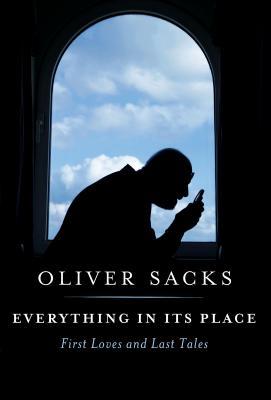
Everything in Its Place: First Loves and Last Tales by Oliver Sacks
From the bestselling author of Gratitude and On the Move , a final volume of essays that showcases Sacks's broad range of interests--from his passions for ferns, swimming, and horsetails, to his final case histories exploring schizophrenia, dementia, and Alzheimer's. Oliver Sacks, renowned scientist and storyteller, is adored by readers for his neurological case hi From the bestselling author of Gratitude and On the Move , a final volume of essays that showcases Sacks's broad range of interests--from his passions for ferns, swimming, and horsetails, to his final case histories exploring schizophrenia, dementia, and Alzheimer's. Oliver Sacks, renowned scientist and storyteller, is adored by readers for his neurological case histories, his fascination and familiarity with human behaviour at its most unexpected and unfamiliar. Everything in Its Place is a celebration of Sacks's myriad interests, all told with his characteristic compassion, erudition, and luminous prose. From the celebrated case history of Spalding Gray that appeared in The New Yorker four months before his death to reflections on mental asylums; from piercing accounts of Schizophrenia to a reminiscence of Robin Williams; from the riveting tale of a medical colleague falling victim to Alzheimer's to the cinematography of Michael Powell, this volume celebrates and reflects the wondrous curiosity of Oliver Sacks.
I WANT TO READ THIS
Infinite Powers: How Calculus Reveals the Secrets of the Universe by Steven H. Strogatz
From preeminent math personality and author of The Joy of x, a brilliant and endlessly appealing explanation of calculus – how it works and why it makes our lives immeasurably better. Without calculus, we wouldn’t have cell phones, TV, GPS, or ultrasound. We wouldn’t have unraveled DNA or discovered Neptune or figured out how to put 5,000 songs in your pocket. Though From preeminent math personality and author of The Joy of x, a brilliant and endlessly appealing explanation of calculus – how it works and why it makes our lives immeasurably better. Without calculus, we wouldn’t have cell phones, TV, GPS, or ultrasound. We wouldn’t have unraveled DNA or discovered Neptune or figured out how to put 5,000 songs in your pocket. Though many of us were scared away from this essential, engrossing subject in high school and college, Steven Strogatz’s brilliantly creative, down‑to‑earth history shows that calculus is not about complexity; it’s about simplicity. It harnesses an unreal number—infinity—to tackle real‑world problems, breaking them down into easier ones and then reassembling the answers into solutions that feel miraculous. Infinite Powers recounts how calculus tantalized and thrilled its inventors, starting with its first glimmers in ancient Greece and bringing us right up to the discovery of gravitational waves (a phenomenon predicted by calculus). Strogatz reveals how this form of math rose to the challenges of each age: how to determine the area of a circle with only sand and a stick; how to explain why Mars goes “backwards” sometimes; how to make electricity with magnets; how to ensure your rocket doesn’t miss the moon; how to turn the tide in the fight against AIDS. As Strogatz proves, calculus is truly the language of the universe. By unveiling the principles of that language, Infinite Powers makes us marvel at the world anew.
I WANT TO READ THIS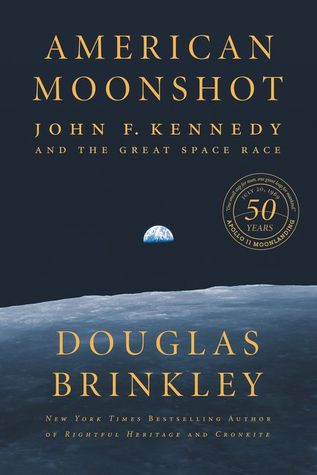
American Moonshot: John F. Kennedy and the Great Space Race by Douglas Brinkley
Instant New York Times Bestseller As the fiftieth anniversary of the first lunar landing approaches, the award winning historian and perennial New York Times bestselling author takes a fresh look at the space program, President John F. Kennedy’s inspiring challenge, and America’s race to the moon. “We choose to go to the Moon in this decade and do the other things, not becau Instant New York Times Bestseller As the fiftieth anniversary of the first lunar landing approaches, the award winning historian and perennial New York Times bestselling author takes a fresh look at the space program, President John F. Kennedy’s inspiring challenge, and America’s race to the moon. “We choose to go to the Moon in this decade and do the other things, not because they are easy, but because they are hard; because that goal will serve to organize and measure the best of our energies and skills, because that challenge is one that we are willing to accept, one we are unwilling to postpone, and one we intend to win.”—President John F. Kennedy On May 25, 1961, JFK made an astonishing announcement: his goal of putting a man on the moon by the end of the decade. In this engrossing, fast-paced epic, Douglas Brinkley returns to the 1960s to recreate one of the most exciting and ambitious achievements in the history of humankind. American Moonshot brings together the extraordinary political, cultural, and scientific factors that fueled the birth and development of NASA and the Mercury, Gemini and Apollo projects, which shot the United States to victory in the space race against the Soviet Union at the height of the Cold War. Drawing on new primary source material and major interviews with many of the surviving figures who were key to America’s success, Brinkley brings this fascinating history to life as never before. American Moonshot is a portrait of the brilliant men and women who made this giant leap possible, the technology that enabled us to propel men beyond earth’s orbit to the moon and return them safely, and the geopolitical tensions that spurred Kennedy to commit himself fully to this audacious dream. Brinkley’s ensemble cast of New Frontier characters include rocketeer Wernher von Braun, astronaut John Glenn and space booster Lyndon Johnson. A vivid and enthralling chronicle of one of the most thrilling, hopeful, and turbulent eras in the nation’s history, American Moonshot is an homage to scientific ingenuity, human curiosity, and the boundless American spirit.
I WANT TO READ THIS
Falter: Has the Human Game Begun to Play Itself Out? by Bill McKibben
Thirty years ago Bill McKibben offered one of the earliest warnings about climate change. Now he broadens the warning: the entire human game, he suggests, has begun to play itself out. Bill McKibben’s groundbreaking book The End of Nature -- issued in dozens of languages and long regarded as a classic -- was the first book to alert us to global warming. But the danger is br Thirty years ago Bill McKibben offered one of the earliest warnings about climate change. Now he broadens the warning: the entire human game, he suggests, has begun to play itself out. Bill McKibben’s groundbreaking book The End of Nature -- issued in dozens of languages and long regarded as a classic -- was the first book to alert us to global warming. But the danger is broader than that: even as climate change shrinks the space where our civilization can exist, new technologies like artificial intelligence and robotics threaten to bleach away the variety of human experience. Falter tells the story of these converging trends and of the ideological fervor that keeps us from bringing them under control. And then, drawing on McKibben’s experience in building 350.org, the first truly global citizens movement to combat climate change, it offers some possible ways out of the trap. We’re at a bleak moment in human history -- and we’ll either confront that bleakness or watch the civilization our forebears built slip away. Falter is a powerful and sobering call to arms, to save not only our planet but also our humanity.
I WANT TO READ THIS
Down from the Mountain: The Life and Death of a Grizzly Bear by Bryce Andrews
The story of a grizzly bear named Millie: her life, death, and cubs, and what they reveal about the changing character of the American West. The grizzly is one of North America’s last large predators. Their range is diminished, but they’re spreading into the West again, where once they were king. The challenge: humans rule the roost now, and most are wary, at best, as g The story of a grizzly bear named Millie: her life, death, and cubs, and what they reveal about the changing character of the American West. The grizzly is one of North America’s last large predators. Their range is diminished, but they’re spreading into the West again, where once they were king. The challenge: humans rule the roost now, and most are wary, at best, as grizzlies approach. In searing detail, award‑winning writer, Montana rancher, and conservationist Bryce Andrews tells us about one such grizzly. Millie was a typical mother: strong, cunning, fiercely protective of her cubs. But raising those cubs was hard. The mountains were changing, as the climate warmed and people crowded the valleys. There were obvious dangers, like poachers, and subtle ones, like the corn field that drew her into human territory, and sure trouble. That trouble is where Bryce’s story intersects with Millie’s. He shares both in Down from the Mountain, showing how this singular drama is a piece of a much larger one in the West: an entangled, bloody collision between people protecting a life they’ve known for generations, and the people fighting to preserve one of America’s wildest landscapes.
I WANT TO READ THIS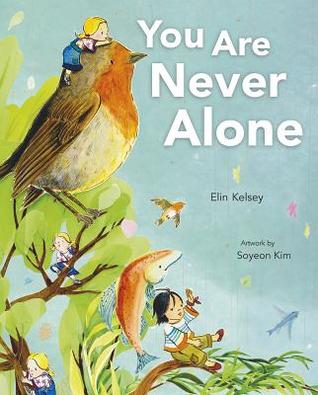
You Are Never Alone by Elin Kelsey , Soyeon Kim (Illustrations)
From the creators of You Are Stardust and Wild Ideas comes a new informational picture book that explores how humans are inextricably connected to nature. This book draws examples from the clouds and the cosmos, the seafloor and the surface of our skin, to show how we are never alone: we are always surrounded and supported by nature. Whether it's gravity holding us tight; From the creators of You Are Stardust and Wild Ideas comes a new informational picture book that explores how humans are inextricably connected to nature. This book draws examples from the clouds and the cosmos, the seafloor and the surface of our skin, to show how we are never alone: we are always surrounded and supported by nature. Whether it's gravity holding us tight; our lungs breathing oxygen synthesized by plants; the countless microorganisms that build our immunity; or the whales whose waste fertilizes the plankton that feed the fish we eat: nature touches every aspect of how we live. Using lyrical text grounded in current science alongside detailed diorama art, this book presents the idea that we thrive through connections to the land and sea and sky, and togetherness is key to nature. It encourages inquiry-based learning, inviting readers to wonder, ask questions, observe the natural world, and engage with big ideas. An author's note at the end offers more insight into the research behind the text.
I WANT TO READ THIS
Invisible Women: Data Bias in a World Designed for Men by Caroline Criado Perez
Imagine a world where your phone is too big for your hand, where your doctor prescribes a drug that is wrong for your body, where in a car accident you are 47% more likely to be seriously injured, where every week the countless hours of work you do are not recognised or valued. If any of this sounds familiar, chances are that you're a woman. Invisible Women shows us how, in Imagine a world where your phone is too big for your hand, where your doctor prescribes a drug that is wrong for your body, where in a car accident you are 47% more likely to be seriously injured, where every week the countless hours of work you do are not recognised or valued. If any of this sounds familiar, chances are that you're a woman. Invisible Women shows us how, in a world largely built for and by men, we are systematically ignoring half the population. It exposes the gender data gap – a gap in our knowledge that is at the root of perpetual, systemic discrimination against women, and that has created a pervasive but invisible bias with a profound effect on women’s lives. Award-winning campaigner and writer Caroline Criado Perez brings together for the first time an impressive range of case studies, stories and new research from across the world that illustrate the hidden ways in which women are forgotten, and the impact this has on their health and well-being. From government policy and medical research, to technology, workplaces, urban planning and the media, Invisible Women reveals the biased data that excludes women. In making the case for change, this powerful and provocative book will make you see the world anew.
I WANT TO READ THIS
Burnout: The Secret to Unlocking the Stress Cycle by Emily Nagoski , Amelia Nagoski
This groundbreaking book explains why women experience burnout differently than men—and provides a simple, science-based plan to help women minimize stress, manage emotions, and live a more joyful life. Burnout. Many women in America have experienced it. What’s expected of women and what it’s really like to be a woman in today’s world are two very different things—and women This groundbreaking book explains why women experience burnout differently than men—and provides a simple, science-based plan to help women minimize stress, manage emotions, and live a more joyful life. Burnout. Many women in America have experienced it. What’s expected of women and what it’s really like to be a woman in today’s world are two very different things—and women exhaust themselves trying to close the gap between them. How can you “love your body” when every magazine cover has ten diet tips for becoming “your best self”? How do you “lean in” at work when you’re already operating at 110 percent and aren’t recognized for it? How can you live happily and healthily in a sexist world that is constantly telling you you’re too fat, too needy, too noisy, and too selfish? Sisters Emily Nagoski, PhD, and Amelia Nagoski, DMA, are here to help end the cycle of feeling overwhelmed and exhausted. Instead of asking us to ignore the very real obstacles and societal pressures that stand between women and well-being, they explain with compassion and optimism what we’re up against—and show us how to fight back. In these pages you’ll learn • what you can do to complete the biological stress cycle—and return your body to a state of relaxation • how to manage the “monitor” in your brain that regulates the emotion of frustration • how the Bikini Industrial Complex makes it difficult for women to love their bodies—and how to defend yourself against it • why rest, human connection, and befriending your inner critic are keys to recovering and preventing burnout With the help of eye-opening science, prescriptive advice, and helpful worksheets and exercises, all women will find something transformative in these pages—and will be empowered to create positive change. Emily and Amelia aren’t here to preach the broad platitudes of expensive self-care or insist that we strive for the impossible goal of “having it all.” Instead, they tell us that we are enough, just as we are—and that wellness, true wellness, is within our reach.
I WANT TO READ THIS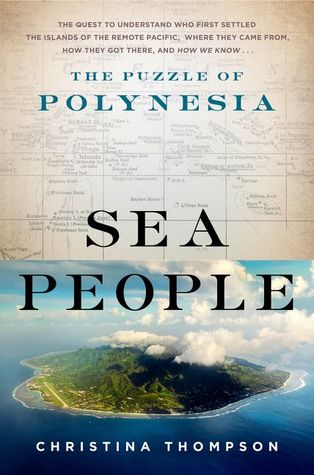
Sea People: The Puzzle of Polynesia by Christina Thompson
A blend of Jared Diamond’s Guns, Germs, and Steel and Simon Winchester’s Pacific, a thrilling intellectual detective story that looks deep into the past to uncover who first settled the islands of the remote Pacific, where they came from, how they got there, and how we know. For more than a millennium, Polynesians have occupied the remotest islands in the Pacific Ocean, a A blend of Jared Diamond’s Guns, Germs, and Steel and Simon Winchester’s Pacific, a thrilling intellectual detective story that looks deep into the past to uncover who first settled the islands of the remote Pacific, where they came from, how they got there, and how we know. For more than a millennium, Polynesians have occupied the remotest islands in the Pacific Ocean, a vast triangle stretching from Hawaii to New Zealand to Easter Island. Until the arrival of European explorers they were the only people to have ever lived there. Both the most closely related and the most widely dispersed people in the world before the era of mass migration, Polynesians can trace their roots to a group of epic voyagers who ventured out into the unknown in one of the greatest adventures in human history. How did the earliest Polynesians find and colonize these far-flung islands? How did a people without writing or metal tools conquer the largest ocean in the world? This conundrum, which came to be known as the Problem of Polynesian Origins, emerged in the eighteenth century as one of the great geographical mysteries of mankind. For Christina Thompson, this mystery is personal: her Maori husband and their sons descend directly from these ancient navigators. In Sea People, Thompson explores the fascinating story of these ancestors, as well as those of the many sailors, linguists, archaeologists, folklorists, biologists, and geographers who have puzzled over this history for three hundred years. A masterful mix of history, geography, anthropology, and the science of navigation, Sea People combines the thrill of exploration with the drama of discovery in a vivid tour of one of the most captivating regions in the world. Sea People includes an 8-page photo insert, illustrations throughout, and 2 endpaper maps.
I WANT TO READ THIS
Biased: Uncovering the Hidden Prejudice That Shapes What We See, Think, and Do by Jennifer L. Eberhardt
From one of the world's leading experts on unconscious racial bias, a personal examination of one of the central controversies and culturally powerful issues of our time, and its influence on contemporary race relations and criminal justice. We do not have to be racist to be biased. With a perspective that is both scientific, investigative, and also informed by personal exp From one of the world's leading experts on unconscious racial bias, a personal examination of one of the central controversies and culturally powerful issues of our time, and its influence on contemporary race relations and criminal justice. We do not have to be racist to be biased. With a perspective that is both scientific, investigative, and also informed by personal experience, Eberhardt offers a reasoned look into the effects of implicit racial bias, ranging from the subtle to the dramatic. Racial bias can lead to disparities in education, employment, housing, and the criminal justice system--and then those very disparities further reinforce the problem. In Biased, Eberhardt reveals how even when we are not aware of bias and genuinely wish to treat all people equally, ingrained stereotypes can infect our visual perception, attention, memory, and behavior. Eberhardt's extensive work as a consultant to law enforcement, as well as a researcher with unprecedented access to data including footage from police officers' body-worn cameras, informs every aspect of her book and makes it much more than a work of social psychology. Her research occurs not just in the laboratory but in police departments, courtrooms, prisons, boardrooms, and on the street. Interviews are interwoven with memories and stories from Eberhardt's own life and family. She offers practical suggestions for reform, and takes the reader behind the scenes to police departments implementing her suggestions. Refusing to shy away from the tragic consequences of prejudice, Eberhardt addresses how racial bias is not the fault of nor restricted to a few "bad apples" in police departments or other institutions. We can see evidence of bias at all levels of society in media, education, and business practices. In Biased, Eberhardt reminds us that racial bias is a human problem--one all people can play a role in solving.
I WANT TO READ THIS
The Secret Wisdom of Nature: Trees, Animals, and the Extraordinary Balance of All Living Things ― Stories from Science and Observation by Peter Wohlleben
The final book in The Mysteries of Nature trilogy by the New York Times bestselling author of The Hidden Life of Trees, Peter Wohlleben. Nature is full of surprises: deciduous trees affect the rotation of the Earth, cranes sabotage the production of Iberian ham, and coniferous forests can make it rain. But what are the processes that drive these incredible phenomena? And wh The final book in The Mysteries of Nature trilogy by the New York Times bestselling author of The Hidden Life of Trees, Peter Wohlleben. Nature is full of surprises: deciduous trees affect the rotation of the Earth, cranes sabotage the production of Iberian ham, and coniferous forests can make it rain. But what are the processes that drive these incredible phenomena? And why do they matter? In The Secret Wisdom of Nature, master storyteller and international sensation Peter Wohlleben takes readers on a thought-provoking exploration of the vast natural systems that make life on Earth possible. In this tour of an almost unfathomable world, Wohlleben describes the fascinating interplay between animals and plants and answers such questions as: How do they influence each other? Do lifeforms communicate across species boundaries? And what happens when this finely tuned system gets out of sync? By introducing us to the latest scientific discoveries and recounting his own insights from decades of observing nature, one of the world’s most famous foresters shows us how to recapture our sense of awe so we can see the world around us with completely new eyes.
I WANT TO READ THIS
Coders: The Making of a New Tribe and the Remaking of the World by Clive Thompson
From acclaimed tech writer Clive Thompson, a brilliant and immersive anthropological reckoning with the most powerful tribe in the world today, computer programmers - where they come from, how they think, what makes for greatness in their world, and what should give us pause. You use software nearly every instant you're awake. And this may sound weirdly obvious, but every s From acclaimed tech writer Clive Thompson, a brilliant and immersive anthropological reckoning with the most powerful tribe in the world today, computer programmers - where they come from, how they think, what makes for greatness in their world, and what should give us pause. You use software nearly every instant you're awake. And this may sound weirdly obvious, but every single one of those pieces of software was written by a programmer. Programmers are thus among the most quietly influential people on the planet. As we live in a world made of software, they're the architects. The decisions they make guide our behavior. When they make something newly easy to do, we do a lot more of it. If they make it hard or impossible to do something, we do less of it. If we want to understand how today's world works, we ought to understand something about coders. Who exactly are the people that are building today's world? What makes them tick? What type of personality is drawn to writing software? And perhaps most interestingly -- what does it do to them? One of the first pieces of coding a newbie learns is the program to make the computer say "Hello, world!" Like that piece of code, Clive Thompson's book is a delightful place to begin to understand this vocation, which is both a profession and a way of life, and which essentially didn't exist little more than a generation ago, but now is considered just about the only safe bet we can make about what the future holds. Thompson takes us close to some of the great coders of our time, and unpacks the surprising history of the field, beginning with the first great coders, who were women. Ironically, if we're going to traffic in stereotypes, women are arguably "naturally" better at coding than men, but they were written out of the history, and shoved out of the seats, for reasons that are illuminating. Now programming is indeed, if not a pure brotopia, at least an awfully homogenous community, which attracts people from a very narrow band of backgrounds and personality types. As Thompson learns, the consequences of that are significant - not least being a fetish for disruption at scale that doesn't leave much time for pondering larger moral issues of collateral damage. At the same time, coding is a marvelous new art form that has improved the world in innumerable ways, and Thompson reckons deeply, as no one before him has, with what great coding in fact looks like, who creates it, and where they come from. To get as close to his subject has he can, he picks up the thread of his own long-abandoned coding practice, and tries his mightiest to up his game, with some surprising results. More and more, any serious engagement with the world demands an engagement with code and its consequences, and to understand code, we must understand coders. In that regard, Clive Thompson's Hello, World! is a marvelous and delightful master class.
I WANT TO READ THIS
Shoot for the Moon: The Space Race and the Extraordinary Voyage of Apollo 11 by James Donovan
For the 50th anniversary, the epic story of Apollo 11 and the astronauts, flight controllers, and engineers who made it happen, by the author of the bestselling A Terrible Glory and The Blood of Heroes. On July 20, 1969, Neil Armstrong and Buzz Aldrin became the first humans to walk on the Moon, a moment forever ingrained in history. Perhaps the world's greatest technologic For the 50th anniversary, the epic story of Apollo 11 and the astronauts, flight controllers, and engineers who made it happen, by the author of the bestselling A Terrible Glory and The Blood of Heroes. On July 20, 1969, Neil Armstrong and Buzz Aldrin became the first humans to walk on the Moon, a moment forever ingrained in history. Perhaps the world's greatest technological achievement-and a triumph of American spirit and ingenuity-the Apollo 11 mission, and the entire Apollo program, was a mammoth undertaking involving more than 410,000 men and women dedicated to putting a man on the Moon and winning the Space Race against the Soviets. Seen through the eyes of the those who lived it, Shoot for the Moon reveals the dangers, the challenges, and the sheer determination that defined not only Apollo 11, but also the Mercury and Gemini missions that made it possible. Both sweeping and intimate, and based on exhaustive research and dozens of fresh interviews, bestselling author James Donovan's Shoot for the Moon is the definitive and thrilling account of one of humankind's most extraordinary feats of exploration.
I WANT TO READ THIS
Bad Blood: Secrets and Lies in a Silicon Valley Startup by John Carreyrou
The full inside story of the breathtaking rise and shocking collapse of a multibillion-dollar startup, by the prize-winning journalist who first broke the story and pursued it to the end in the face of pressure and threats from the CEO and her lawyers. In 2014, Theranos founder and CEO Elizabeth Holmes was widely seen as the female Steve Jobs: a brilliant Stanford dropout w The full inside story of the breathtaking rise and shocking collapse of a multibillion-dollar startup, by the prize-winning journalist who first broke the story and pursued it to the end in the face of pressure and threats from the CEO and her lawyers. In 2014, Theranos founder and CEO Elizabeth Holmes was widely seen as the female Steve Jobs: a brilliant Stanford dropout whose startup "unicorn" promised to revolutionize the medical industry with a machine that would make blood tests significantly faster and easier. Backed by investors such as Larry Ellison and Tim Draper, Theranos sold shares in a fundraising round that valued the company at $9 billion, putting Holmes's worth at an estimated $4.7 billion. There was just one problem: The technology didn't work. For years, Holmes had been misleading investors, FDA officials, and her own employees. When Carreyrou, working at The Wall Street Journal, got a tip from a former Theranos employee and started asking questions, both Carreyrou and the Journal were threatened with lawsuits. Undaunted, the newspaper ran the first of dozens of Theranos articles in late 2015. By early 2017, the company's value was zero and Holmes faced potential legal action from the government and her investors. Here is the riveting story of the biggest corporate fraud since Enron, a disturbing cautionary tale set amid the bold promises and gold-rush frenzy of Silicon Valley.
I WANT TO READ THIS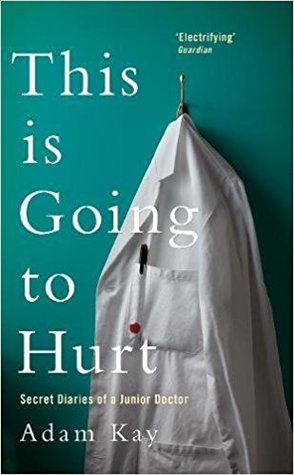
This Is Going to Hurt: Secret Diaries of a Junior Doctor by Adam Kay
Adam Kay was a junior doctor from 2004 until 2010, before a devastating experience on a ward caused him to reconsider his future. He kept a diary throughout his training, and This Is Going to Hurt intersperses tales from the front line of the NHS with reflections on the current crisis. The result is a first-hand account of life as a junior doctor in all its joy, pain, sacr Adam Kay was a junior doctor from 2004 until 2010, before a devastating experience on a ward caused him to reconsider his future. He kept a diary throughout his training, and This Is Going to Hurt intersperses tales from the front line of the NHS with reflections on the current crisis. The result is a first-hand account of life as a junior doctor in all its joy, pain, sacrifice and maddening bureaucracy, and a love letter to those who might at any moment be holding our lives in their hands.
I WANT TO READ THIS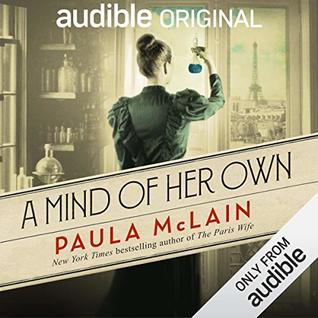
A Mind of Her Own by Paula McLain , Hillary Huber (Narrator)
Listening time: 1 hour and 15 minutes From Paula McLain, the best-selling author of The Paris Wife and Love and Ruin, comes a breathtakingly intimate story of the brilliant, willful Marie Curie - a young woman in Paris on the verge of her greatest discovery yet: herself. Paris, 1893. Twenty-five-year-old Marie Sklodowska is studying science at the Sorbonne - one of the only Listening time: 1 hour and 15 minutes From Paula McLain, the best-selling author of The Paris Wife and Love and Ruin, comes a breathtakingly intimate story of the brilliant, willful Marie Curie - a young woman in Paris on the verge of her greatest discovery yet: herself. Paris, 1893. Twenty-five-year-old Marie Sklodowska is studying science at the Sorbonne - one of the only universities in the world that has begun to admit women. A thousand miles from her native Poland, with no money and the odds stacked against any woman daring to pursue a career in such a rigorous field, Marie throws herself into her studies. She's certain that to succeed in a man's world, she will have to go it alone. Her meticulous plans get thrown slightly off-course when Marie attracts the attention of an accomplished young physicist, himself on the precipice of greatness. Thirty-five-year-old Pierre Curie, famous for his work on symmetry, believes he has found in Marie an equal who shares his devotion to scientific discovery. He offers to help with her work, and soon begins to court her. But to Marie, men have always been an obstacle, love a distraction from her goals. She hasn't come this far to let either stand in the way of her dreams - dreams Pierre insists they can share. In A Mind of Her Own, McLain taps into the luminous mind and complex heart of a singular woman caught between order and chaos, science and love in the period just before the world would learn her name.
I WANT TO READ THIS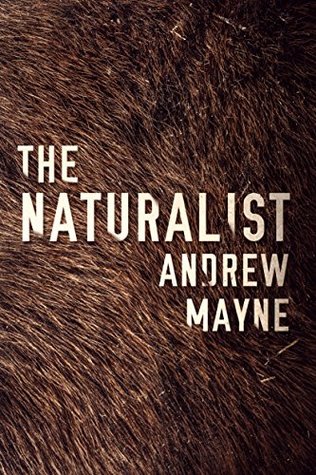
The Naturalist by Andrew Mayne
Professor Theo Cray is trained to see patterns where others see chaos. So when mutilated bodies found deep in the Montana woods leave the cops searching blindly for clues, Theo sees something they missed. Something unnatural. Something only he can stop. As a computational biologist, Theo is more familiar with digital code and microbes than the dark arts of forensic sleuthin Professor Theo Cray is trained to see patterns where others see chaos. So when mutilated bodies found deep in the Montana woods leave the cops searching blindly for clues, Theo sees something they missed. Something unnatural. Something only he can stop. As a computational biologist, Theo is more familiar with digital code and microbes than the dark arts of forensic sleuthing. But a field trip to Montana suddenly lands him in the middle of an investigation into the bloody killing of one of his former students. As more details, and bodies, come to light, the local cops determine that the killer is either a grizzly gone rogue… or Theo himself. Racing to stay one step ahead of the police, Theo must use his scientific acumen to uncover the killer. Will he be able to become as cunning as the predator he hunts—before he becomes its prey?
I WANT TO READ THIS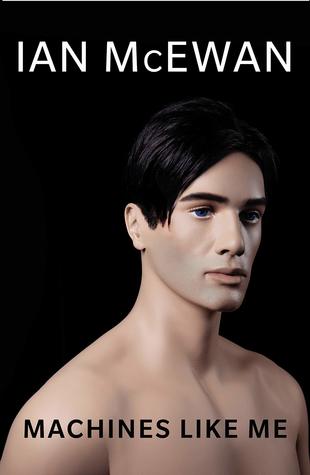
Machines Like Me by Ian McEwan
Britain has lost the Falklands war, Margaret Thatcher battles Tony Benn for power and Alan Turing achieves a breakthrough in artificial intelligence. In a world not quite like this one, two lovers will be tested beyond their understanding. Machines Like Me occurs in an alternative 1980s London. Charlie, drifting through life and dodging full-time employment, is in love with Britain has lost the Falklands war, Margaret Thatcher battles Tony Benn for power and Alan Turing achieves a breakthrough in artificial intelligence. In a world not quite like this one, two lovers will be tested beyond their understanding. Machines Like Me occurs in an alternative 1980s London. Charlie, drifting through life and dodging full-time employment, is in love with Miranda, a bright student who lives with a terrible secret. When Charlie comes into money, he buys Adam, one of the first batch of synthetic humans. With Miranda’s assistance, he co-designs Adam’s personality. This near-perfect human is beautiful, strong and clever – a love triangle soon forms. These three beings will confront a profound moral dilemma. Ian McEwan’s subversive and entertaining new novel poses fundamental questions: what makes us human? Our outward deeds or our inner lives? Could a machine understand the human heart? This provocative and thrilling tale warns of the power to invent things beyond our control.
I WANT TO READ THIS
Factfulness: Ten Reasons We're Wrong About the World – and Why Things Are Better Than You Think by Hans Rosling , Ola Rosling , Anna Rosling Rönnlund
Factfulness: The stress-reducing habit of only carrying opinions for which you have strong supporting facts. When asked simple questions about global trends—what percentage of the world’s population live in poverty; why the world’s population is increasing; how many girls finish school—we systematically get the answers wrong. So wrong that a chimpanzee choosing answers at r Factfulness: The stress-reducing habit of only carrying opinions for which you have strong supporting facts. When asked simple questions about global trends—what percentage of the world’s population live in poverty; why the world’s population is increasing; how many girls finish school—we systematically get the answers wrong. So wrong that a chimpanzee choosing answers at random will consistently outguess teachers, journalists, Nobel laureates, and investment bankers. In Factfulness, Professor of International Health and global TED phenomenon Hans Rosling, together with his two long-time collaborators, Anna and Ola, offers a radical new explanation of why this happens. They reveal the ten instincts that distort our perspective—from our tendency to divide the world into two camps (usually some version of us and them) to the way we consume media (where fear rules) to how we perceive progress (believing that most things are getting worse). Our problem is that we don’t know what we don’t know, and even our guesses are informed by unconscious and predictable biases. It turns out that the world, for all its imperfections, is in a much better state than we might think. That doesn’t mean there aren’t real concerns. But when we worry about everything all the time instead of embracing a worldview based on facts, we can lose our ability to focus on the things that threaten us most. Inspiring and revelatory, filled with lively anecdotes and moving stories, Factfulness is an urgent and essential book that will change the way you see the world and empower you to respond to the crises and opportunities of the future. “This book is my last battle in my life-long mission to fight devastating ignorance…Previously I armed myself with huge data sets, eye-opening software, an energetic learning style and a Swedish bayonet for sword-swallowing. It wasn’t enough. But I hope this book will be.” — Hans Rosling, February 2017.
I WANT TO READ THIS
Unsheltered by Barbara Kingsolver (Author, Narrator)
The New York Times bestselling author of Flight Behavior, The Lacuna, and The Poisonwood Bible and recipient of numerous literary awards—including the National Humanities Medal, the Dayton Literary Peace Prize, and the Orange Prize—returns with a timely novel that interweaves past and present to explore the human capacity for resiliency and compassion in times of great uph The New York Times bestselling author of Flight Behavior, The Lacuna, and The Poisonwood Bible and recipient of numerous literary awards—including the National Humanities Medal, the Dayton Literary Peace Prize, and the Orange Prize—returns with a timely novel that interweaves past and present to explore the human capacity for resiliency and compassion in times of great upheaval. Willa Knox has always prided herself on being the embodiment of responsibility for her family. Which is why it’s so unnerving that she’s arrived at middle age with nothing to show for her hard work and dedication but a stack of unpaid bills and an inherited brick home in Vineland, New Jersey, that is literally falling apart. The magazine where she worked has folded, and the college where her husband had tenure has closed. The dilapidated house is also home to her ailing and cantankerous Greek father-in-law and her two grown children: her stubborn, free-spirited daughter, Tig, and her dutiful debt-ridden, ivy educated son, Zeke, who has arrived with his unplanned baby in the wake of a life-shattering development. In an act of desperation, Willa begins to investigate the history of her home, hoping that the local historical preservation society might take an interest and provide funding for its direly needed repairs. Through her research into Vineland’s past and its creation as a Utopian community, she discovers a kindred spirit from the 1880s, Thatcher Greenwood. A science teacher with a lifelong passion for honest investigation, Thatcher finds himself under siege in his community for telling the truth: his employer forbids him to speak of the exciting new theory recently published by Charles Darwin. Thatcher’s friendships with a brilliant woman scientist and a renegade newspaper editor draw him into a vendetta with the town’s most powerful men. At home, his new wife and status-conscious mother-in-law bristle at the risk of scandal, and dismiss his financial worries and the news that their elegant house is structurally unsound. Brilliantly executed and compulsively listenable, Unsheltered is the story of two families, in two centuries, who live at the corner of Sixth and Plum, as they navigate the challenges of surviving a world in the throes of major cultural shifts. In this mesmerizing story told in alternating chapters, Willa and Thatcher come to realize that though the future is uncertain, even unnerving, shelter can be found in the bonds of kindred—whether family or friends—and in the strength of the human spirit.
I WANT TO READ THIS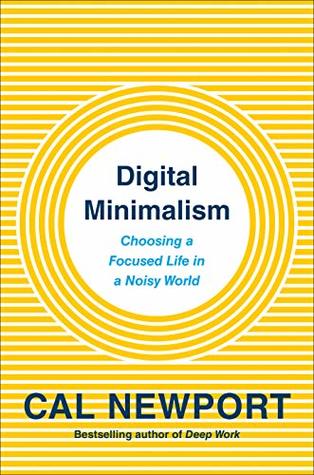
Digital Minimalism: Choosing a Focused Life in a Noisy World by Cal Newport
Minimalism is the art of knowing how much is just enough. Digital minimalism applies this idea to our personal technology. It's the key to living a focused life in an increasingly noisy world. In this timely and enlightening book, the bestselling author of Deep Work introduces a philosophy for technology use that has already improved countless lives. Digital minimalists are Minimalism is the art of knowing how much is just enough. Digital minimalism applies this idea to our personal technology. It's the key to living a focused life in an increasingly noisy world. In this timely and enlightening book, the bestselling author of Deep Work introduces a philosophy for technology use that has already improved countless lives. Digital minimalists are all around us. They're the calm, happy people who can hold long conversations without furtive glances at their phones. They can get lost in a good book, a woodworking project, or a leisurely morning run. They can have fun with friends and family without the obsessive urge to document the experience. They stay informed about the news of the day, but don't feel overwhelmed by it. They don't experience "fear of missing out" because they already know which activities provide them meaning and satisfaction. Now, Newport gives us a name for this quiet movement, and makes a persuasive case for its urgency in our tech-saturated world. Common sense tips, like turning off notifications, or occasional rituals like observing a digital sabbath, don't go far enough in helping us take back control of our technological lives, and attempts to unplug completely are complicated by the demands of family, friends and work. What we need instead is a thoughtful method to decide what tools to use, for what purposes, and under what conditions. Drawing on a diverse array of real-life examples, from Amish farmers to harried parents to Silicon Valley programmers, Newport identifies the common practices of digital minimalists and the ideas that underpin them. He shows how digital minimalists are rethinking their relationship to social media, rediscovering the pleasures of the offline world, and reconnecting with their inner selves through regular periods of solitude. He then shares strategies for integrating these practices into your life, starting with a thirty-day "digital declutter" process that has already helped thousands feel less overwhelmed and more in control. Technology is intrinsically neither good nor bad. The key is using it to support your goals and values, rather than letting it use you. This book shows the way.
I WANT TO READ THIS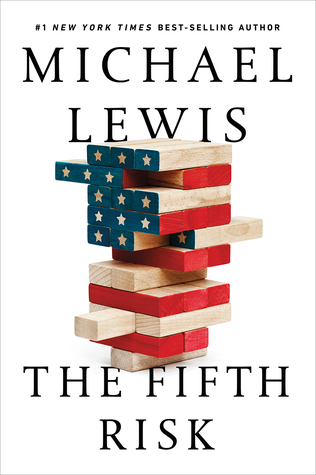
The Fifth Risk by Michael Lewis
What are the consequences if the people given control over our government have no idea how it works? "The election happened," remembers Elizabeth Sherwood-Randall, then deputy secretary of the Department of Energy. "And then there was radio silence." Across all departments, similar stories were playing out: Trump appointees were few and far between; those that did show up w What are the consequences if the people given control over our government have no idea how it works? "The election happened," remembers Elizabeth Sherwood-Randall, then deputy secretary of the Department of Energy. "And then there was radio silence." Across all departments, similar stories were playing out: Trump appointees were few and far between; those that did show up were shockingly uninformed about the functions of their new workplace. Some even threw away the briefing books that had been prepared for them. Michael Lewis’s brilliant narrative takes us into the engine rooms of a government under attack by its own leaders. In Agriculture the funding of vital programs like food stamps and school lunches is being slashed. The Commerce Department may not have enough staff to conduct the 2020 Census properly. Over at Energy, where international nuclear risk is managed, it’s not clear there will be enough inspectors to track and locate black market uranium before terrorists do. Willful ignorance plays a role in these looming disasters. If your ambition is to maximize short-term gains without regard to the long-term cost, you are better off not knowing those costs. If you want to preserve your personal immunity to the hard problems, it’s better never to really understand those problems. There is upside to ignorance, and downside to knowledge. Knowledge makes life messier. It makes it a bit more difficult for a person who wishes to shrink the world to a worldview. If there are dangerous fools in this book, there are also heroes, unsung, of course. They are the linchpins of the system—those public servants whose knowledge, dedication, and proactivity keep the machinery running. Michael Lewis finds them, and he asks them what keeps them up at night.
I WANT TO READ THIS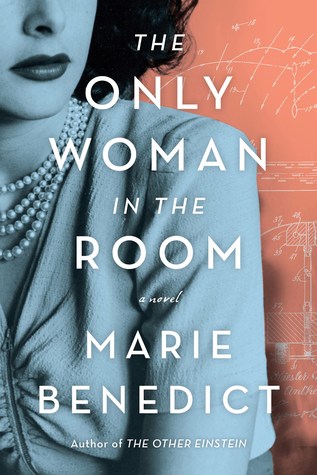
The Only Woman in the Room by Marie Benedict
She was beautiful. She was a genius. Could the world handle both? A powerful, illuminating novel about Hedy Lamarr. Hedy Kiesler is lucky. Her beauty leads to a starring role in a controversial film and marriage to a powerful Austrian arms dealer, allowing her to evade Nazi persecution despite her Jewish heritage. But Hedy is also intelligent. At lavish Vienna dinner parti She was beautiful. She was a genius. Could the world handle both? A powerful, illuminating novel about Hedy Lamarr. Hedy Kiesler is lucky. Her beauty leads to a starring role in a controversial film and marriage to a powerful Austrian arms dealer, allowing her to evade Nazi persecution despite her Jewish heritage. But Hedy is also intelligent. At lavish Vienna dinner parties, she overhears the Third Reich's plans. One night in 1937, desperate to escape her controlling husband and the rise of the Nazis, she disguises herself and flees her husband's castle. She lands in Hollywood, where she becomes Hedy Lamarr, screen star. But Hedy is keeping a secret even more shocking than her Jewish heritage: she is a scientist. She has an idea that might help the country and that might ease her guilt for escaping alone -- if anyone will listen to her. A powerful novel based on the incredible true story of the glamour icon and scientist whose groundbreaking invention revolutionized modern communication, The Only Woman in the Room is a masterpiece.
I WANT TO READ THIS
The Overstory by Richard Powers
The Overstory is a sweeping, impassioned work of activism and resistance that is also a stunning evocation of—and paean to—the natural world. From the roots to the crown and back to the seeds, Richard Powers’s twelfth novel unfolds in concentric rings of interlocking fables that range from antebellum New York to the late twentieth-century Timber Wars of the Pacific Northwe The Overstory is a sweeping, impassioned work of activism and resistance that is also a stunning evocation of—and paean to—the natural world. From the roots to the crown and back to the seeds, Richard Powers’s twelfth novel unfolds in concentric rings of interlocking fables that range from antebellum New York to the late twentieth-century Timber Wars of the Pacific Northwest and beyond. There is a world alongside ours—vast, slow, interconnected, resourceful, magnificently inventive, and almost invisible to us. This is the story of a handful of people who learn how to see that world and who are drawn up into its unfolding catastrophe. A New York Times Bestseller.
I WANT TO READ THIS
Lost and Wanted by Nell Freudenberger
'In the first few months after Charlie died, I began hearing from her much more frequently' Helen Clapp is a physics professor. She doesn't believe in pseudo-science, or time travel and especially not in ghosts. So when she gets a missed call from Charlie, her closest friend from university with whom she hasn't spoken in over a year, Helen thinks there must be some mistake. 'In the first few months after Charlie died, I began hearing from her much more frequently' Helen Clapp is a physics professor. She doesn't believe in pseudo-science, or time travel and especially not in ghosts. So when she gets a missed call from Charlie, her closest friend from university with whom she hasn't spoken in over a year, Helen thinks there must be some mistake. Because Charlie died two days ago. Then when her young son, Jack, claims to have seen Charlie in their house just the other day, Helen begins to have doubts. Through the grief of the husband and daughter Charlie left behind, Helen is drawn into the orbit of Charlie's world, slotting in the missing pieces of her friend's past. And, as she delves into the web of their shared history, Helen finds herself entangled in the forgotten threads of her own life. "Lost and Wanted" is a searing novel from one of America's most exciting writers about the sacred knottiness of female friendship, the forces which fuse us together and those which drive us apart.
I WANT TO READ THIS
The Radium Girls: The Dark Story of America's Shining Women by Kate Moore
The incredible true story of the women who fought America's Undark danger The Curies' newly discovered element of radium makes gleaming headlines across the nation as the fresh face of beauty, and wonder drug of the medical community. From body lotion to tonic water, the popular new element shines bright in the otherwise dark years of the First World War.Meanwhile, hundre The incredible true story of the women who fought America's Undark danger The Curies' newly discovered element of radium makes gleaming headlines across the nation as the fresh face of beauty, and wonder drug of the medical community. From body lotion to tonic water, the popular new element shines bright in the otherwise dark years of the First World War.Meanwhile, hundreds of girls toil amidst the glowing dust of the radium-dial factories. The glittering chemical covers their bodies from head to toe; they light up the night like industrious fireflies. With such a coveted job, these "shining girls" are the luckiest alive — until they begin to fall mysteriously ill.But the factories that once offered golden opportunities are now ignoring all claims of the gruesome side effects, and the women's cries of corruption. And as the fatal poison of the radium takes hold, the brave shining girls find themselves embroiled in one of the biggest scandals of America's early 20th century, and in a groundbreaking battle for workers' rights that will echo for centuries to come. Written with a sparkling voice and breakneck pace, The Radium Girls fully illuminates the inspiring young women exposed to the "wonder" substance of radium, and their awe-inspiring strength in the face of almost impossible circumstances. Their courage and tenacity led to life-changing regulations, research into nuclear bombing, and ultimately saved hundreds of thousands of lives...
I WANT TO READ THIS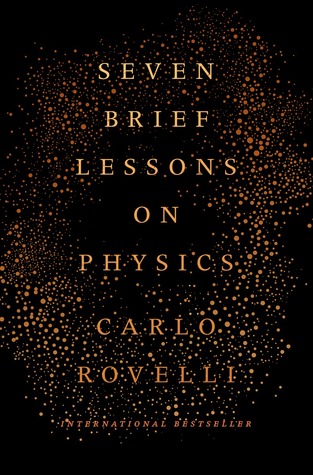
Seven Brief Lessons on Physics by Carlo Rovelli , Simon Carnell (Translator) , Erica Segre (Translator)
Everything you need to know about the beauty of modern physics in less than 100 pages. In seven brief lessons, Italian theoretical physicist Carlo Rovelli guides readers with admirable clarity through the most transformative physics breakthroughs of the twentieth and twenty-first centuries. This playful, entertaining and mind-bending introduction to modern physics, already Everything you need to know about the beauty of modern physics in less than 100 pages. In seven brief lessons, Italian theoretical physicist Carlo Rovelli guides readers with admirable clarity through the most transformative physics breakthroughs of the twentieth and twenty-first centuries. This playful, entertaining and mind-bending introduction to modern physics, already a major bestseller in Italy, explains general relativity, quantum mechanics, elementary particles, gravity, black holes, the complex architecture of the universe, and the role of humans in the strange world Rovelli describes. This is a book about the joy of discovery. It takes readers to the frontiers of our knowledge: to the most minute reaches of the fabric of space, back to the origins of the cosmos, and into the workings of our minds. “Here, on the edge of what we know, in contact with the ocean of the unknown, shines the mystery and the beauty of the world,” Rovelli writes. “And it’s breathtaking.”
I WANT TO READ THIS
The Uninhabitable Earth: Life After Warming by David Wallace-Wells
"The Uninhabitable Earth hits you like a comet, with an overflow of insanely lyrical prose about our pending Armageddon."--Andrew Solomon, author of The Noonday Demon It is worse, much worse, than you think. If your anxiety about global warming is dominated by fears of sea-level rise, you are barely scratching the surface of what terrors are possible. In California, wildfir "The Uninhabitable Earth hits you like a comet, with an overflow of insanely lyrical prose about our pending Armageddon."--Andrew Solomon, author of The Noonday Demon It is worse, much worse, than you think. If your anxiety about global warming is dominated by fears of sea-level rise, you are barely scratching the surface of what terrors are possible. In California, wildfires now rage year-round, destroying thousands of homes. Across the US, "500-year" storms pummel communities month after month, and floods displace tens of millions annually. This is only a preview of the changes to come. And they are coming fast. Without a revolution in how billions of humans conduct their lives, parts of the Earth could become close to uninhabitable, and other parts horrifically inhospitable, as soon as the end of this century. In his travelogue of our near future, David Wallace-Wells brings into stark relief the climate troubles that await--food shortages, refugee emergencies, and other crises that will reshape the globe. But the world will be remade by warming in more profound ways as well, transforming our politics, our culture, our relationship to technology, and our sense of history. It will be all-encompassing, shaping and distorting nearly every aspect of human life as it is lived today. Like An Inconvenient Truth and Silent Spring before it, The Uninhabitable Earth is both a meditation on the devastation we have brought upon ourselves and an impassioned call to action. For just as the world was brought to the brink of catastrophe within the span of a lifetime, the responsibility to avoid it now belongs to a single generation.
I WANT TO READ THIS
A Brief History of Time by Stephen Hawking
In the ten years since its publication in 1988, Stephen Hawking's classic work has become a landmark volume in scientific writing, with more than nine million copies in forty languages sold worldwide. That edition was on the cutting edge of what was then known about the origins and nature of the universe. But the intervening years have seen extraordinary advances in the te In the ten years since its publication in 1988, Stephen Hawking's classic work has become a landmark volume in scientific writing, with more than nine million copies in forty languages sold worldwide. That edition was on the cutting edge of what was then known about the origins and nature of the universe. But the intervening years have seen extraordinary advances in the technology of observing both the micro- and the macrocosmic worlds. These observations have confirmed many of Professor Hawking's theoretical predictions in the first edition of his book, including the recent discoveries of the Cosmic Background Explorer satellite (COBE), which probed back in time to within 300,000 years of the universe's beginning and revealed wrinkles in the fabric of space-time that he had projected. Eager to bring to his original text the new knowledge revealed by these observations, as well as his own recent research, Professor Hawking has prepared a new introduction to the book, written an entirely new chapter on wormholes and time travel, and updated the chapters throughout.
I WANT TO READ THIS
A Short History of Nearly Everything by Bill Bryson , William Roberts (Narrator)
In Bryson's biggest book, he confronts his greatest challenge: to understand—and, if possible, answer—the oldest, biggest questions we have posed about the universe and ourselves. Taking as territory everything from the Big Bang to the rise of civilization, Bryson seeks to understand how we got from there being nothing at all to there being us. To that end, he has attached In Bryson's biggest book, he confronts his greatest challenge: to understand—and, if possible, answer—the oldest, biggest questions we have posed about the universe and ourselves. Taking as territory everything from the Big Bang to the rise of civilization, Bryson seeks to understand how we got from there being nothing at all to there being us. To that end, he has attached himself to a host of the world’s most advanced (and often obsessed) archaeologists, anthropologists, and mathematicians, travelling to their offices, laboratories, and field camps. He has read (or tried to read) their books, pestered them with questions, apprenticed himself to their powerful minds. A Short History of Nearly Everything is the record of this quest, and it is a sometimes profound, sometimes funny, and always supremely clear and entertaining adventure in the realms of human knowledge, as only Bill Bryson can render it. Science has never been more involving or entertaining.
I WANT TO READ THIS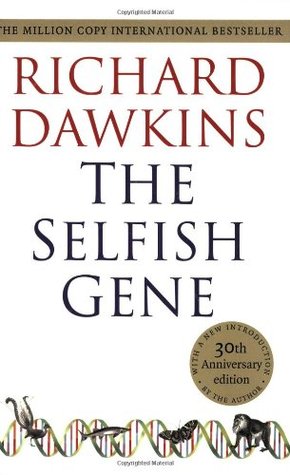
The Selfish Gene by Richard Dawkins
The Selfish Gene: 30th Anniversary Edition—with a new Introduction by the Author Inheriting the mantle of revolutionary biologist from Darwin, Watson, and Crick, Richard Dawkins forced an enormous change in the way we see ourselves and the world with the publication of The Selfish Gene. Suppose, instead of thinking about organisms using genes to reproduce themselves, as we The Selfish Gene: 30th Anniversary Edition—with a new Introduction by the Author Inheriting the mantle of revolutionary biologist from Darwin, Watson, and Crick, Richard Dawkins forced an enormous change in the way we see ourselves and the world with the publication of The Selfish Gene. Suppose, instead of thinking about organisms using genes to reproduce themselves, as we had since Mendel's work was rediscovered, we turn it around and imagine that "our" genes build and maintain us in order to make more genes. That simple reversal seems to answer many puzzlers which had stumped scientists for years, and we haven't thought of evolution in the same way since. Why are there miles and miles of "unused" DNA within each of our bodies? Why should a bee give up its own chance to reproduce to help raise her sisters and brothers? With a prophet's clarity, Dawkins told us the answers from the perspective of molecules competing for limited space and resources to produce more of their own kind. Drawing fascinating examples from every field of biology, he paved the way for a serious re-evaluation of evolution. He also introduced the concept of self-reproducing ideas, or memes, which (seemingly) use humans exclusively for their propagation. If we are puppets, he says, at least we can try to understand our strings. —Rob Lightner
I WANT TO READ THIS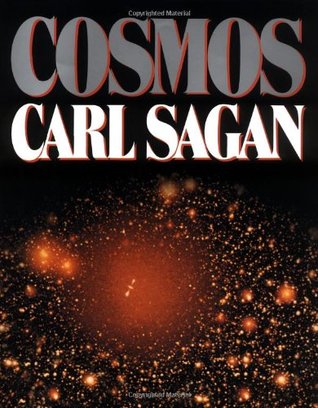
Cosmos by Carl Sagan
Cosmos has 13 heavily illustrated chapters, corresponding to the 13 episodes of the Cosmos television series. In the book, Sagan explores 15 billion years of cosmic evolution and the development of science and civilization. Cosmos traces the origins of knowledge and the scientific method, mixing science and philosophy, and speculates to the future of science. The book also Cosmos has 13 heavily illustrated chapters, corresponding to the 13 episodes of the Cosmos television series. In the book, Sagan explores 15 billion years of cosmic evolution and the development of science and civilization. Cosmos traces the origins of knowledge and the scientific method, mixing science and philosophy, and speculates to the future of science. The book also discusses the underlying premises of science by providing biographical anecdotes about many prominent scientists throughout history, placing their contributions into the broader context of the development of modern science. The book covers a broad range of topics, comprising Sagan's reflections on anthropological, cosmological, biological, historical, and astronomical matters from antiquity to contemporary times. Sagan reiterates his position on extraterrestrial life—that the magnitude of the universe permits the existence of thousands of alien civilizations, but no credible evidence exists to demonstrate that such life has ever visited earth.
I WANT TO READ THIS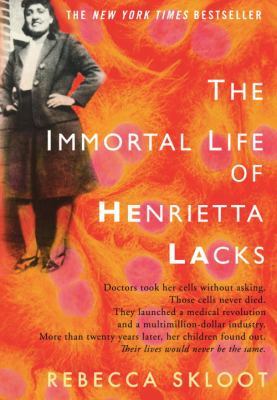
The Immortal Life of Henrietta Lacks by Rebecca Skloot
Intimate in feeling, astonishing in scope, and impossible to put down, The Immortal Life of Henrietta Lacks captures the beauty and drama of scientific discovery, as well as its human consequences. Her name was Henrietta Lacks, but scientists know her as HeLa. She was a poor Southern tobacco farmer who worked the same land as her slave ancestors, yet her cells—taken witho Intimate in feeling, astonishing in scope, and impossible to put down, The Immortal Life of Henrietta Lacks captures the beauty and drama of scientific discovery, as well as its human consequences. Her name was Henrietta Lacks, but scientists know her as HeLa. She was a poor Southern tobacco farmer who worked the same land as her slave ancestors, yet her cells—taken without her knowledge—became one of the most important tools in medicine. The first “immortal” human cells grown in culture, they are still alive today, though she has been dead for more than sixty years. If you could pile all HeLa cells ever grown onto a scale, they’d weigh more than 50 million metric tons—as much as a hundred Empire State Buildings. HeLa cells were vital for developing the polio vaccine; uncovered secrets of cancer, viruses, and the atom bomb’s effects; helped lead to important advances like in vitro fertilization, cloning, and gene mapping; and have been bought and sold by the billions.Yet Henrietta Lacks remains virtually unknown, buried in an unmarked grave.Now Rebecca Skloot takes us on an extraordinary journey, from the “colored” ward of Johns Hopkins Hospital in the 1950s to stark white laboratories with freezers full of HeLa cells; from Henrietta’s small, dying hometown of Clover, Virginia — a land of wooden slave quarters, faith healings, and voodoo — to East Baltimore today, where her children and grandchildren live and struggle with the legacy of her cells.Henrietta’s family did not learn of her “immortality” until more than twenty years after her death, when scientists investigating HeLa began using her husband and children in research without informed consent. And though the cells had launched a multimillion-dollar industry that sells human biological materials, her family never saw any of the profits. As Rebecca Skloot so brilliantly shows, the story of the Lacks family — past and present — is inextricably connected to the dark history of experimentation on African Americans, the birth of bioethics, and the legal battles over whether we control the stuff we are made of.Over the decade it took to uncover this story, Rebecca became enmeshed in the lives of the Lacks family—especially Henrietta’s daughter Deborah, who was devastated to learn about her mother’s cells. She was consumed with questions: Had scientists cloned her mother? Did it hurt her when researchers infected her cells with viruses and shot them into space? What happened to her sister, Elsie, who died in a mental institution at the age of fifteen? And if her mother was so important to medicine, why couldn’t her children afford health insurance?Intimate in feeling, astonishing in scope, and impossible to put down, The Immortal Life of Henrietta Lacks captures the beauty and drama of scientific discovery, as well as its human consequences.
I WANT TO READ THIS
The Origin of Species by Charles Darwin
Darwin's theory of natural selection issued a profound challenge to orthodox thought and belief: no being or species has been specifically created; all are locked into a pitiless struggle for existence, with extinction looming for those not fitted for the task. Yet The Origin of Species (1859) is also a humane and inspirational vision of ecological interrelatedness, reveal Darwin's theory of natural selection issued a profound challenge to orthodox thought and belief: no being or species has been specifically created; all are locked into a pitiless struggle for existence, with extinction looming for those not fitted for the task. Yet The Origin of Species (1859) is also a humane and inspirational vision of ecological interrelatedness, revealing the complex mutual interdependencies between animal and plant life, climate and physical environment, and - by implication - within the human world. Written for the general reader, in a style which combines the rigour of science with the subtlety of literature, The Origin of Species remains one of the founding documents of the modern age.
I WANT TO READ THIS
The Elegant Universe: Superstrings, Hidden Dimensions, and the Quest for the Ultimate Theory by Brian Greene
The international bestseller that inspired a major Nova special and sparked a new understanding of the universe, now with a new preface and epilogue. Brian Greene, one of the world's leading string theorists, peels away layers of mystery to reveal a universe that consists of eleven dimensions, where the fabric of space tears and repairs itself, and all matter—from the small The international bestseller that inspired a major Nova special and sparked a new understanding of the universe, now with a new preface and epilogue. Brian Greene, one of the world's leading string theorists, peels away layers of mystery to reveal a universe that consists of eleven dimensions, where the fabric of space tears and repairs itself, and all matter—from the smallest quarks to the most gargantuan supernovas—is generated by the vibrations of microscopically tiny loops of energy. The Elegant Universe makes some of the most sophisticated concepts ever contemplated accessible and thoroughly entertaining, bringing us closer than ever to understanding how the universe works.
I WANT TO READ THIS
Astrophysics for People in a Hurry by Neil deGrasse Tyson
What is the nature of space and time? How do we fit within the universe? How does the universe fit within us? There’s no better guide through these mind-expanding questions than acclaimed astrophysicist and best-selling author Neil deGrasse Tyson. But today, few of us have time to contemplate the cosmos. So Tyson brings the universe down to Earth succinctly and clearly, wit What is the nature of space and time? How do we fit within the universe? How does the universe fit within us? There’s no better guide through these mind-expanding questions than acclaimed astrophysicist and best-selling author Neil deGrasse Tyson. But today, few of us have time to contemplate the cosmos. So Tyson brings the universe down to Earth succinctly and clearly, with sparkling wit, in tasty chapters consumable anytime and anywhere in your busy day.
I WANT TO READ THIS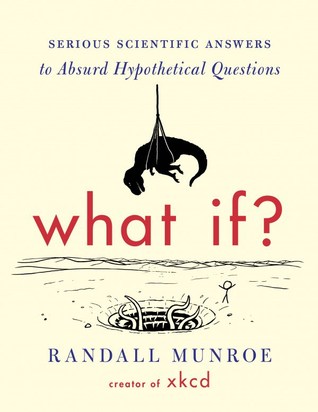
What If?: Serious Scientific Answers to Absurd Hypothetical Questions by Randall Munroe
Randall Munroe left NASA in 2005 to start up his hugely popular site XKCD 'a web comic of romance, sarcasm, math and language' which offers a witty take on the world of science and geeks. It now has 600,000 to a million page hits daily. Every now and then, Munroe would get emails asking him to arbitrate a science debate. 'My friend and I were arguing about what would happe Randall Munroe left NASA in 2005 to start up his hugely popular site XKCD 'a web comic of romance, sarcasm, math and language' which offers a witty take on the world of science and geeks. It now has 600,000 to a million page hits daily. Every now and then, Munroe would get emails asking him to arbitrate a science debate. 'My friend and I were arguing about what would happen if a bullet got struck by lightning, and we agreed that you should resolve it . . . ' He liked these questions so much that he started up What If. If your cells suddenly lost the power to divide, how long would you survive? How dangerous is it, really, to be in a swimming pool in a thunderstorm? If we hooked turbines to people exercising in gyms, how much power could we produce? What if everyone only had one soulmate? When (if ever) did the sun go down on the British empire? How fast can you hit a speed bump while driving and live? What would happen if the moon went away? In pursuit of answers, Munroe runs computer simulations, pores over stacks of declassified military research memos, solves differential equations, and consults with nuclear reactor operators. His responses are masterpieces of clarity and hilarity, studded with memorable cartoons and infographics. They often predict the complete annihilation of humankind, or at least a really big explosion. Far more than a book for geeks, WHAT IF: Serious Scientific Answers to Absurd Hypothetical Questions explains the laws of science in operation in a way that every intelligent reader will enjoy and feel much the smarter for having read.
I WANT TO READ THIS
The Demon-Haunted World: Science as a Candle in the Dark by Carl Sagan , Ann Druyan
How can we make intelligent decisions about our increasingly technology-driven lives if we don’t understand the difference between the myths of pseudoscience and the testable hypotheses of science? Pulitzer Prize-winning author and distinguished astronomer Carl Sagan argues that scientific thinking is critical not only to the pursuit of truth but to the very well-being of How can we make intelligent decisions about our increasingly technology-driven lives if we don’t understand the difference between the myths of pseudoscience and the testable hypotheses of science? Pulitzer Prize-winning author and distinguished astronomer Carl Sagan argues that scientific thinking is critical not only to the pursuit of truth but to the very well-being of our democratic institutions. Casting a wide net through history and culture, Sagan examines and authoritatively debunks such celebrated fallacies of the past as witchcraft, faith healing, demons, and UFOs. And yet, disturbingly, in today's so-called information age, pseudoscience is burgeoning with stories of alien abduction, channeling past lives, and communal hallucinations commanding growing attention and respect. As Sagan demonstrates with lucid eloquence, the siren song of unreason is not just a cultural wrong turn but a dangerous plunge into darkness that threatens our most basic freedoms.
I WANT TO READ THIS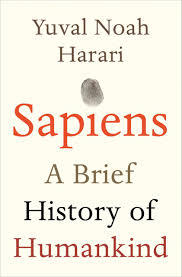
Sapiens: A Brief History of Humankind by Yuval Noah Harari
100,000 years ago, at least six human species inhabited the earth. Today there is just one. Us. Homo sapiens. How did our species succeed in the battle for dominance? Why did our foraging ancestors come together to create cities and kingdoms? How did we come to believe in gods, nations and human rights; to trust money, books and laws; and to be enslaved by bureaucracy, tim 100,000 years ago, at least six human species inhabited the earth. Today there is just one. Us. Homo sapiens. How did our species succeed in the battle for dominance? Why did our foraging ancestors come together to create cities and kingdoms? How did we come to believe in gods, nations and human rights; to trust money, books and laws; and to be enslaved by bureaucracy, timetables and consumerism? And what will our world be like in the millennia to come? In Sapiens, Dr Yuval Noah Harari spans the whole of human history, from the very first humans to walk the earth to the radical – and sometimes devastating – breakthroughs of the Cognitive, Agricultural and Scientific Revolutions. Drawing on insights from biology, anthropology, paleontology and economics, he explores how the currents of history have shaped our human societies, the animals and plants around us, and even our personalities. Have we become happier as history has unfolded? Can we ever free our behaviour from the heritage of our ancestors? And what, if anything, can we do to influence the course of the centuries to come? Bold, wide-ranging and provocative, Sapiens challenges everything we thought we knew about being human: our thoughts, our actions, our power ... and our future.
I WANT TO READ THIS
Stiff: The Curious Lives of Human Cadavers by Mary Roach
Stiff is an oddly compelling, often hilarious exploration of the strange lives of our bodies postmortem. For two thousand years, cadavers—some willingly, some unwittingly—have been involved in science's boldest strides and weirdest undertakings. In this fascinating account, Mary Roach visits the good deeds of cadavers over the centuries and tells the engrossing story of ou Stiff is an oddly compelling, often hilarious exploration of the strange lives of our bodies postmortem. For two thousand years, cadavers—some willingly, some unwittingly—have been involved in science's boldest strides and weirdest undertakings. In this fascinating account, Mary Roach visits the good deeds of cadavers over the centuries and tells the engrossing story of our bodies when we are no longer with them.
I WANT TO READ THIS
"Surely You're Joking, Mr. Feynman!": Adventures of a Curious Character by Richard Feynman , Ralph Leighton (Editor)
A New York Times bestseller—the outrageous exploits of one of this century's greatest scientific minds and a legendary American original. Richard Feynman, winner of the Nobel Prize in physics, thrived on outrageous adventures. Here he recounts in his inimitable voice his experience trading ideas on atomic physics with Einstein and Bohr and ideas on gambling with Nick the Gr A New York Times bestseller—the outrageous exploits of one of this century's greatest scientific minds and a legendary American original. Richard Feynman, winner of the Nobel Prize in physics, thrived on outrageous adventures. Here he recounts in his inimitable voice his experience trading ideas on atomic physics with Einstein and Bohr and ideas on gambling with Nick the Greek; cracking the uncrackable safes guarding the most deeply held nuclear secrets; accompanying a ballet on his bongo drums; painting a naked female toreador. In short, here is Feynman's life in all its eccentric—a combustible mixture of high intelligence, unlimited curiosity, and raging chutzpah.
I WANT TO READ THIS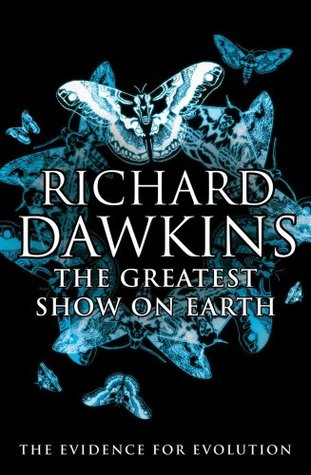
The Greatest Show on Earth: The Evidence for Evolution by Richard Dawkins
Charles Darwin’s masterpiece, On the Origin of Species, shook society to its core on publication in 1859. Darwin was only too aware of the storm his theory of evolution would provoke but he would surely have raised an incredulous eyebrow at the controversy still raging a century and a half later. Evolution is accepted as scientific fact by all reputable scientists and inde Charles Darwin’s masterpiece, On the Origin of Species, shook society to its core on publication in 1859. Darwin was only too aware of the storm his theory of evolution would provoke but he would surely have raised an incredulous eyebrow at the controversy still raging a century and a half later. Evolution is accepted as scientific fact by all reputable scientists and indeed theologians, yet millions of people continue to question its veracity. In The Greatest Show on Earth Richard Dawkins takes on creationists, including followers of ‘Intelligent Design’ and all those who question the fact of evolution through natural selection. Like a detective arriving on the scene of a crime, he sifts through fascinating layers of scientific facts and disciplines to build a cast-iron case: from the living examples of natural selection in birds and insects; the ‘time clocks’ of trees and radioactive dating that calibrate a timescale for evolution; the fossil record and the traces of our earliest ancestors; to confirmation from molecular biology and genetics. All of this, and much more, bears witness to the truth of evolution. The Greatest Show on Earth comes at a critical time: systematic opposition to the fact of evolution is now flourishing as never before, especially in America. In Britain and elsewhere in the world, teachers witness insidious attempts to undermine the status of science in their classrooms. Richard Dawkins provides unequivocal evidence that boldly and comprehensively rebuts such nonsense. At the same time he shares with us his palpable love of the natural world and the essential role that science plays in its interpretation. Written with elegance, wit and passion, it is hard-hitting, absorbing and totally convincing.
I WANT TO READ THIS
The Grand Design by Stephen Hawking , Leonard Mlodinow
THE FIRST MAJOR WORK IN NEARLY A DECADE BY ONE OF THE WORLD’S GREAT THINKERS—A MARVELOUSLY CONCISE BOOK WITH NEW ANSWERS TO THE ULTIMATE QUESTIONS OF LIFE When and how did the universe begin? Why are we here? Why is there something rather than nothing? What is the nature of reality? Why are the laws of nature so finely tuned as to allow for the existence of beings like our THE FIRST MAJOR WORK IN NEARLY A DECADE BY ONE OF THE WORLD’S GREAT THINKERS—A MARVELOUSLY CONCISE BOOK WITH NEW ANSWERS TO THE ULTIMATE QUESTIONS OF LIFE When and how did the universe begin? Why are we here? Why is there something rather than nothing? What is the nature of reality? Why are the laws of nature so finely tuned as to allow for the existence of beings like ourselves? And, finally, is the apparent “grand design” of our universe evidence of a benevolent creator who set things in motion—or does science offer another explanation? The most fundamental questions about the origins of the universe and of life itself, once the province of philosophy, now occupy the territory where scientists, philosophers, and theologians meet—if only to disagree. In their new book, Stephen Hawking and Leonard Mlodinow present the most recent scientific thinking about the mysteries of the universe, in nontechnical language marked by both brilliance and simplicity. In The Grand Design they explain that according to quantum theory, the cosmos does not have just a single existence or history, but rather that every possible history of the universe exists simultaneously. When applied to the universe as a whole, this idea calls into question the very notion of cause and effect. But the “top-down” approach to cosmology that Hawking and Mlodinow describe would say that the fact that the past takes no definite form means that we create history by observing it, rather than that history creates us. The authors further explain that we ourselves are the product of quantum fluctuations in the very early universe, and show how quantum theory predicts the “multiverse”—the idea that ours is just one of many universes that appeared spontaneously out of nothing, each with different laws of nature. Along the way Hawking and Mlodinow question the conventional concept of reality, posing a “model-dependent” theory of reality as the best we can hope to find. And they conclude with a riveting assessment of M-theory, an explanation of the laws governing us and our universe that is currently the only viable candidate for a complete “theory of everything.” If confirmed, they write, it will be the unified theory that Einstein was looking for, and the ultimate triumph of human reason. A succinct, startling, and lavishly illustrated guide to discoveries that are altering our understanding and threatening some of our most cherished belief systems, The Grand Design is a book that will inform—and provoke—like no other.
I WANT TO READ THIS